AI人工智能英文介绍
- 格式:ppt
- 大小:2.33 MB
- 文档页数:15
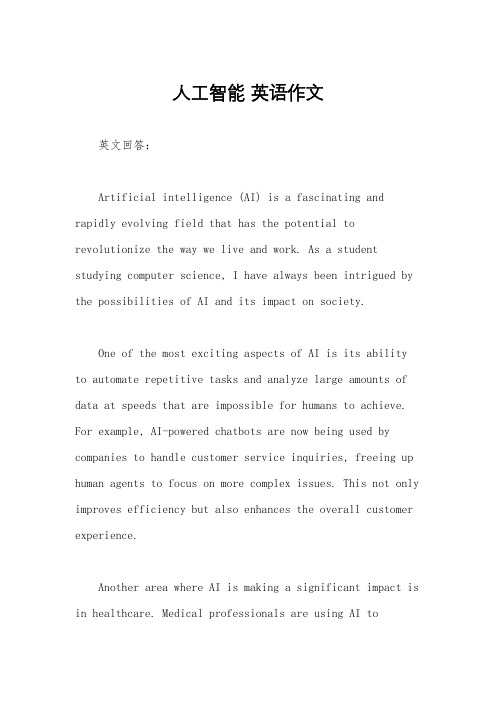
人工智能英语作文英文回答:Artificial intelligence (AI) is a fascinating and rapidly evolving field that has the potential to revolutionize the way we live and work. As a student studying computer science, I have always been intrigued by the possibilities of AI and its impact on society.One of the most exciting aspects of AI is its ability to automate repetitive tasks and analyze large amounts of data at speeds that are impossible for humans to achieve. For example, AI-powered chatbots are now being used by companies to handle customer service inquiries, freeing up human agents to focus on more complex issues. This not only improves efficiency but also enhances the overall customer experience.Another area where AI is making a significant impact is in healthcare. Medical professionals are using AI toanalyze medical images and detect patterns that mayindicate diseases such as cancer. This has the potential to improve early diagnosis and ultimately save lives.However, the rapid advancement of AI also raisesethical and societal concerns. For instance, there are concerns about the potential for AI to replace human jobs, leading to unemployment and economic inequality. Additionally, there are concerns about the use of AI in surveillance and privacy invasion.中文回答:人工智能(AI)是一个迷人且快速发展的领域,有潜力彻底改变我们的生活和工作方式。

人工智能的英语解释英文回答:Artificial Intelligence (AI) is the simulation of human intelligence processes by machines, especially computer systems. AI research has been highly successful in developing effective techniques for solving a wide range of problems in many fields, including computer vision, natural language processing, and machine learning.Applications of AI.AI has a wide range of applications in variousindustries and sectors, including:Healthcare: AI-powered systems are used for disease diagnosis, drug discovery, and personalized treatment plans.Finance: AI algorithms are employed for fraud detection, risk assessment, and trading decisions.Transportation: AI is used for autonomous driving, traffic management, and route optimization.Manufacturing: AI techniques are utilized for predictive maintenance, process optimization, and quality control.Retail: AI systems are used for personalized recommendations, demand forecasting, and inventory management.Types of AI.AI can be categorized into different types based on the level of intelligence and autonomy exhibited by the system:Reactive Machines: These AI systems react to the current environment without the ability to learn or remember past experiences.Limited Memory: AI systems with limited memory canstore past experiences and use them to inform current decisions.Theory of Mind: These AI systems can understand the mental states of other entities, such as beliefs, desires, and intentions.Self-Awareness: AI systems with self-awareness are able to reflect on their own thoughts and actions.Benefits of AI.The adoption of AI technology offers numerous potential benefits, such as:Efficiency: AI systems can automate repetitive and time-consuming tasks, freeing up human workers for more complex and creative endeavors.Accuracy: AI algorithms can process large volumes of data and extract patterns and insights that are difficult for humans to identify.Consistency: AI systems can consistently perform tasks without the errors or biases that can affect humandecision-making.Innovation: AI technology drives innovation by enabling the development of new products, services, and processes.Economic Growth: AI has the potential to contribute to economic growth by increasing productivity and creating new job opportunities.Challenges of AI.While AI holds great promise, it also presents several challenges that need to be addressed:Job Displacement: AI systems can displace human workers in certain job roles, raising concerns about unemployment.Bias: AI algorithms can inherit biases from the data they are trained on, leading to unfair or discriminatory outcomes.Security: AI systems can be vulnerable to hacking and misuse, potentially leading to security breaches.Ethics: The rapid advancement of AI raises ethical questions about the responsible development and use of AI technology.Future of AI.The future of AI is highly anticipated, with researchers and industry leaders envisioning a world where AI systems seamlessly collaborate with humans to solve complex problems and enhance human capabilities. As AI technology continues to evolve, it is expected to play an increasingly significant role in shaping the future of society and the economy.中文回答:什么是人工智能?人工智能(AI)是指机器(尤其是计算机系统)模拟人类智能过程的能力。
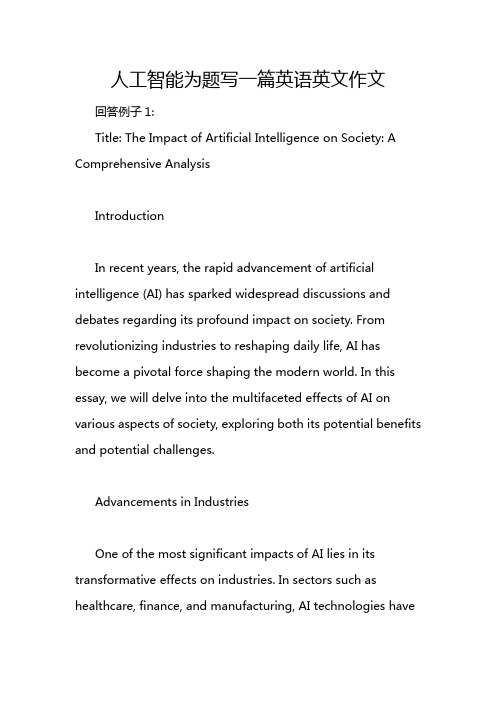
人工智能为题写一篇英语英文作文回答例子1:Title: The Impact of Artificial Intelligence on Society: A Comprehensive AnalysisIntroductionIn recent years, the rapid advancement of artificial intelligence (AI) has sparked widespread discussions and debates regarding its profound impact on society. From revolutionizing industries to reshaping daily life, AI has become a pivotal force shaping the modern world. In this essay, we will delve into the multifaceted effects of AI on various aspects of society, exploring both its potential benefits and potential challenges.Advancements in IndustriesOne of the most significant impacts of AI lies in its transformative effects on industries. In sectors such as healthcare, finance, and manufacturing, AI technologies haverevolutionized operations, leading to increased efficiency, precision, and productivity. For example, in healthcare,AI-powered diagnostic systems can analyze medical images with unparalleled accuracy, aiding physicians in early detection and treatment planning. Similarly, in finance, AI algorithms are employed for predictive analytics, risk management, and algorithmic trading, optimizing investment strategies and decision-making processes. Moreover, in manufacturing,AI-driven automation has streamlined production lines, reducing costs and minimizing errors.Enhanced Decision-MakingAI's ability to analyze vast amounts of data and extract valuable insights has revolutionized decision-making processes across various domains. Whether it is in business, government, or personal life, AI-driven analytics empower individuals and organizations to make informed decisions based on data-driven evidence. For instance, businesses leverage AI for market analysis, customer segmentation, and demand forecasting, enabling them to adapt to changing market dynamics and gain a competitive edge. Similarly,governments utilize AI for policy formulation, resource allocation, and public service optimization, fostering efficient governance and societal development. Furthermore, individuals benefit from AI-driven personal assistants and recommendation systems, which provide tailored suggestions and assistance based on their preferences and behaviors.Ethical ConsiderationsDespite its numerous benefits, the widespread adoption of AI also raises significant ethical considerations and societal implications. One of the primary concerns revolves around the potential for job displacement due to automation. As AI technologies automate routine tasks and processes, there is a risk of unemployment for workers in various industries, leading to economic disruption and social inequality. Moreover, there are concerns regarding data privacy, algorithmic bias, and the ethical use of AI in decision-making, particularly in sensitive domains such as criminal justice and healthcare. Addressing these ethical challenges requires a multidisciplinary approach, involving stakeholders from academia, industry, and government to establish regulatoryframeworks and ethical guidelines for the responsible development and deployment of AI technologies.Social ImpactThe widespread integration of AI into society also has profound social implications, influencing how we interact, communicate, and perceive the world around us. AI-powered technologies such as social media algorithms, virtual assistants, and recommendation systems shape our online experiences, influencing the content we consume, the information we encounter, and the relationships we form. Moreover, AI-driven automation has the potential to reshape the nature of work, leisure, and education, prompting discussions about universal basic income, retraining programs, and the future of human labor in the age of AI. Additionally, there are concerns about AI's impact on human creativity, empathy, and social cohesion, as well as its potential to exacerbate existing societal divides and inequalities.ConclusionIn conclusion, the impact of artificial intelligence on society is profound and multifaceted, encompassing advancements in industries, enhanced decision-making capabilities, ethical considerations, and social implications. While AI holds tremendous potential to drive innovation, improve efficiency, and enhance quality of life, it also presents significant challenges and risks that must be addressed through responsible development, ethical governance, and inclusive policies. By fostering collaboration and dialogue among stakeholders, we can harness the power of AI to create a more equitable, sustainable, and prosperous future for all.回答例子2:Title: The Transformative Power of Artificial IntelligenceIn the landscape of modern technology, Artificial Intelligence (AI) stands as a pinnacle of innovation, revolutionizing various aspects of human life. Its impact is profound, reshaping industries, redefining economies, and even challenging societal norms. As we delve into the realm of AI, we uncover a tapestry of possibilities, but also a plethora of ethical, social, and existential questions. In this discourse, we traverse through the vistas of AI, exploring its promises, perils,and the path ahead.At its core, AI encompasses the emulation of human intelligence by machines. Through algorithms, data analysis, and machine learning, AI systems can perceive, reason, learn, and adapt, often surpassing human capabilities in specific domains. This ability has catalyzed groundbreaking advancements across industries. In healthcare, AI aids in diagnosis, drug discovery, and personalized treatment plans, enhancing patient care and outcomes. In transportation, AI optimizes routes, manages traffic, and drives the development of autonomous vehicles, promising safer and more efficient mobility. From finance to agriculture, from entertainment to education, AI is ubiquitous, augmenting human endeavors and unlocking new frontiers.Yet, amidst the marvels of AI lie ethical conundrums and societal implications. The proliferation of AI raises concerns about job displacement, as automation threatens traditional employment sectors. Moreover, biases inherent in data and algorithms can perpetuate discrimination, exacerbating social inequalities. The ethical dilemmas surrounding AI governance,privacy, and autonomy demand meticulous scrutiny and responsible regulation. As we entrust AI with increasingly autonomous decision-making capabilities, questions of accountability, transparency, and the preservation of human agency loom large.Furthermore, the advent of Artificial General Intelligence (AGI) poses existential inquiries about the nature of consciousness, intelligence, and the human condition. While AGI remains speculative, its hypothetical emergence prompts reflections on our place in the cosmos and our relationship with technology. The prospect of AI surpassing human intelligence raises philosophical quandaries about morality, consciousness, and the essence of being. As we navigate the trajectory towards AGI, ethical frameworks, existential contemplations, and societal dialogues become imperative.In charting the course forward, collaboration emerges as paramount. Interdisciplinary approaches, drawing from fields such as computer science, ethics, psychology, and philosophy, foster holistic perspectives on AI development and deployment. International cooperation is essential to establishethical standards, regulatory frameworks, and safeguards against misuse. Transparency, accountability, and inclusivity must underpin AI initiatives to mitigate risks and maximize benefits for all stakeholders.Education also plays a pivotal role in shaping the AI landscape. Fostering digital literacy, critical thinking, and ethical reasoning equips individuals to navigate the complexities of AI responsibly. Embracing a culture of lifelong learning empowers individuals to adapt to technological disruptions and harness the potential of AI for societal good.In conclusion, Artificial Intelligence heralds a new epoch of human civilization, characterized by unprecedented innovation and transformation. Its promises are vast, its perils profound, and its trajectory uncertain. As stewards of this technological frontier, we are tasked with harnessing the power of AI to advance human flourishing while safeguarding our collective well-being. Through collaboration, education, and ethical foresight, we embark on a journey towards a futurewhere AI serves as a catalyst for progress, compassion, and the realization of our highest aspirations.。


人工智能的英文短文Artificial Intelligence: Transforming Our WorldArtificial intelligence (AI) is rapidly changing the world we live in. It is a field of computer science that aims to create intelligent machines that can perform tasks that typically require human intelligence.AI has already made a significant impact in various industries. In healthcare, it is being used to diagnose diseases, analyze medical images, and develop personalized treatment plans. In finance, AI algorithms can detect fraud, manage risk, and make investment decisions. In transportation,self-driving cars and drones are being developed with the help of AI.One of the most remarkable aspects of AI is its ability to learn and improve over time. Through machine learning algorithms, AI systems can analyze large amounts of data and identify patterns and trends. This allows them to make more accurate predictions and decisions.However, the development of AI also raises some concerns. As AI becomes more intelligent and autonomous, there are questions about its impact on employment and society. Some people worry that AI will replace human workers and lead to widespread unemployment. Others are concerned about the ethical implications of AI, such as the potential for biased algorithms and the loss of human control.Despite these concerns, the potential benefits of AI are too great to ignore. As we continue to develop and refine AI technologies, we must also address the ethical and social issues that come with it. This will require collaboration between scientists, policymakers, and the public to ensure that AI is developed and used in a way that benefits humanity.In conclusion, artificial intelligence is a powerful technology that has the potential to transform our world. While there are challenges and concerns associated with its development, we must embrace its potential and work together to ensure that it is used for the greater good.。

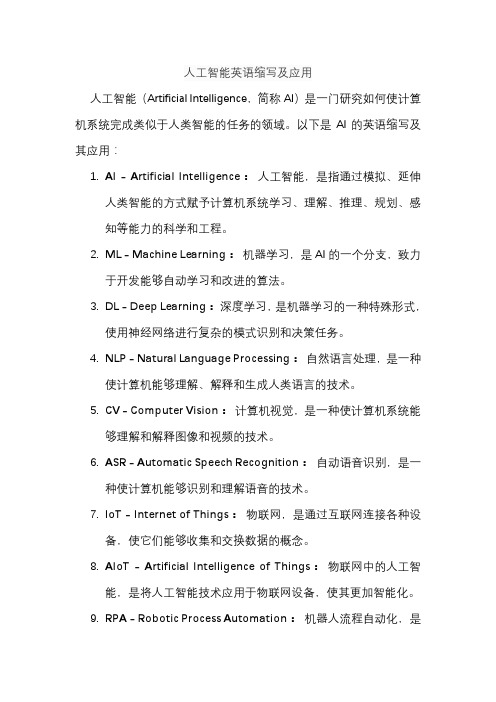
人工智能英语缩写及应用人工智能(Artificial Intelligence,简称AI)是一门研究如何使计算机系统完成类似于人类智能的任务的领域。
以下是AI的英语缩写及其应用:1.AI - Artificial Intelligence:人工智能,是指通过模拟、延伸人类智能的方式赋予计算机系统学习、理解、推理、规划、感知等能力的科学和工程。
2.ML - Machine Learning:机器学习,是AI的一个分支,致力于开发能够自动学习和改进的算法。
3.DL - Deep Learning:深度学习,是机器学习的一种特殊形式,使用神经网络进行复杂的模式识别和决策任务。
4.NLP - Natural Language Processing:自然语言处理,是一种使计算机能够理解、解释和生成人类语言的技术。
5.CV - Computer Vision:计算机视觉,是一种使计算机系统能够理解和解释图像和视频的技术。
6.ASR - Automatic Speech Recognition:自动语音识别,是一种使计算机能够识别和理解语音的技术。
7.IoT - Internet of Things:物联网,是通过互联网连接各种设备,使它们能够收集和交换数据的概念。
8.AIoT - Artificial Intelligence of Things:物联网中的人工智能,是将人工智能技术应用于物联网设备,使其更加智能化。
9.RPA - Robotic Process Automation:机器人流程自动化,是使用软件机器人或“机器人”自动执行重复性业务流程的技术。
10.A GI - Artificial General Intelligence:人工通用智能,是一种具有与人类相似广泛认知能力的理论AI形态。
11.A IaaS - AI as a Service:人工智能即服务,是通过云服务提供商提供的云端人工智能服务。

ai智能介绍英文作文英文:AI, or artificial intelligence, is a rapidly growingfield that involves the development of computer systemsthat can perform tasks that typically require human intelligence, such as visual perception, speech recognition, decision-making, and language translation. AI is revolutionizing many industries, from healthcare to finance to transportation, and has the potential to greatly improve our lives in countless ways.One of the most exciting aspects of AI is its abilityto learn and improve over time. Machine learning algorithms, which are a subset of AI, allow computers to analyze large amounts of data and identify patterns and insights that humans may not be able to see. This can lead to more accurate predictions and better decision-making.Another important area of AI is natural languageprocessing, which involves teaching computers to understand and interpret human language. This is crucial for applications like virtual assistants and chatbots, whichrely on natural language to communicate with users.Overall, AI has the potential to transform our world in ways we can't even imagine yet. However, it's important to remember that AI is still in its early stages and there are many ethical and societal implications to consider as it continues to develop.中文:AI,即人工智能,是一个快速发展的领域,涉及开发能够执行通常需要人类智能的任务的计算机系统,例如视觉感知、语音识别、决策和语言翻译。
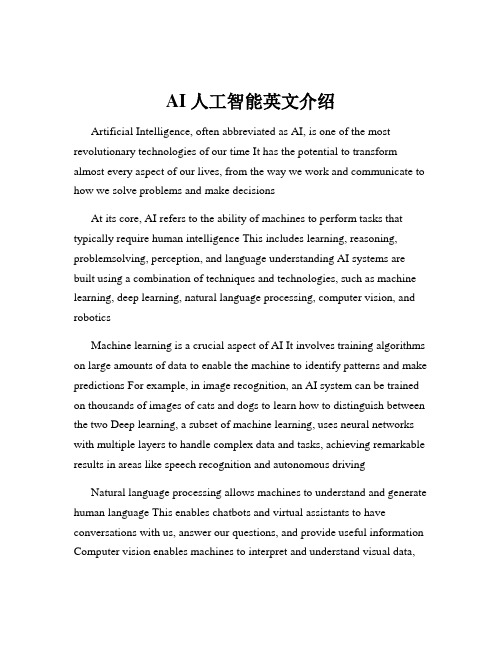
AI 人工智能英文介绍Artificial Intelligence, often abbreviated as AI, is one of the most revolutionary technologies of our time It has the potential to transform almost every aspect of our lives, from the way we work and communicate to how we solve problems and make decisionsAt its core, AI refers to the ability of machines to perform tasks that typically require human intelligence This includes learning, reasoning, problemsolving, perception, and language understanding AI systems are built using a combination of techniques and technologies, such as machine learning, deep learning, natural language processing, computer vision, and roboticsMachine learning is a crucial aspect of AI It involves training algorithms on large amounts of data to enable the machine to identify patterns and make predictions For example, in image recognition, an AI system can be trained on thousands of images of cats and dogs to learn how to distinguish between the two Deep learning, a subset of machine learning, uses neural networks with multiple layers to handle complex data and tasks, achieving remarkable results in areas like speech recognition and autonomous drivingNatural language processing allows machines to understand and generate human language This enables chatbots and virtual assistants to have conversations with us, answer our questions, and provide useful information Computer vision enables machines to interpret and understand visual data,which is essential for applications like facial recognition, object detection, and autonomous vehiclesAI has already made significant impacts in various fields In healthcare, it is used for disease diagnosis, drug discovery, and personalized treatment plans In finance, it helps with fraud detection, risk assessment, and investment decisions In transportation, selfdriving cars and intelligent traffic management systems are being developed Even in entertainment, AI is used to create personalized recommendations and generate realistic virtual charactersHowever, the development of AI also brings some challenges and concerns One of the main concerns is the potential impact on employment As AI automates certain tasks, some jobs may become obsolete, requiring workers to upskill and reskill to adapt to the changing job market Ethical and moral issues also arise, such as bias in algorithms, privacy concerns, and the use of AI in warfareAnother challenge is the interpretability and transparency of AI systems Some AI algorithms are so complex that it is difficult to understand how they arrive at certain decisions, which can lead to trust issues Ensuring that AI is developed and used in an ethical and responsible manner is crucialDespite these challenges, the potential benefits of AI are too great to ignore With continued research and development, AI has the potential to solve some of the world's most pressing problems, such as climate change, disease prevention, and resource managementIn conclusion, AI is a powerful technology that holds both great promise and potential risks As we move forward, it is essential that we approach itsdevelopment and application with caution, ensuring that it benefits humanity as a whole We need to strike a balance between innovation and ethical considerations to shape a future where AI works for the betterment of our society。
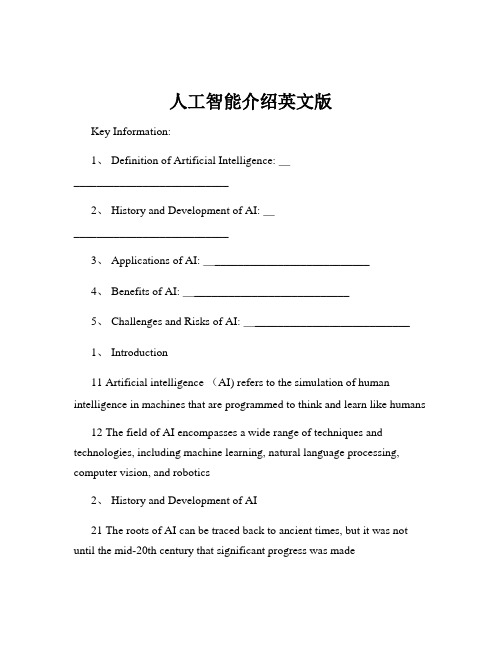
人工智能介绍英文版Key Information:1、 Definition of Artificial Intelligence: ____________________________2、 History and Development of AI: ____________________________3、 Applications of AI: ____________________________4、 Benefits of AI: ____________________________5、 Challenges and Risks of AI: ____________________________1、 Introduction11 Artificial intelligence (AI) refers to the simulation of human intelligence in machines that are programmed to think and learn like humans12 The field of AI encompasses a wide range of techniques and technologies, including machine learning, natural language processing, computer vision, and robotics2、 History and Development of AI21 The roots of AI can be traced back to ancient times, but it was not until the mid-20th century that significant progress was made22 In the 1950s, the concept of AI was formally introduced, and early research focused on developing algorithms for problemsolving and decisionmaking23 Over the years, advancements in computing power, data availability, and algorithmic improvements have led to significant breakthroughs in AI3、 Applications of AI31 Healthcare311 AI is used in medical diagnosis, drug discovery, and patient monitoring312 Machine learning algorithms can analyze large amounts of medical data to identify patterns and predict diseases32 Finance321 In the financial sector, AI is employed for fraud detection, risk assessment, and investment decisionmaking322 Automated trading systems use AI to make rapid and informed trading decisions33 Transportation331 Selfdriving cars and intelligent transportation systems rely on AI for navigation and traffic management332 AI can optimize routes and improve the efficiency of public transportation4、 Benefits of AI41 Increased Efficiency and Productivity411 AIpowered systems can perform tasks faster and more accurately than humans, leading to improved operational efficiency412 Automation of repetitive tasks frees up human resources for more complex and creative work42 Improved DecisionMaking421 By analyzing large amounts of data, AI can provide valuable insights and predictions to support decisionmaking processes422 Businesses and organizations can make more informed and strategic decisions based on AIdriven analytics43 Enhanced Customer Experience431 AIpowered chatbots and virtual assistants offer 24/7 customer service, providing quick and accurate responses432 Personalized recommendations based on AI algorithms enhance the customer experience and increase customer satisfaction5、 Challenges and Risks of AI51 Ethical and Moral Concerns511 Issues such as bias in algorithms, data privacy, and the potential for autonomous weapons raise ethical questions512 Ensuring that AI is developed and used in an ethical and responsible manner is crucial52 Job Displacement521 The automation of certain jobs by AI may lead to unemployment and the need for workforce reskilling and upskilling522 However, new job opportunities are also emerging in the field of AI and related technologies53 Security Risks531 AI systems can be vulnerable to cyberattacks and malicious use532 Safeguarding AI infrastructure and data is essential to prevent security breaches6、 Conclusion61 AI has the potential to bring significant benefits and transform various aspects of our lives62 However, it is essential to address the challenges and risks associated with its development and use to ensure a positive impact on society63 Continued research and ethical considerations will be crucial in shaping the future of AI。

以人工智能为主题的英语作文英文回答:Artificial Intelligence (AI) has emerged as a transformative technology that has the potential to revolutionize numerous aspects of our lives. AI-powered systems leverage advanced algorithms and machine learning techniques to mimic human intelligence and perform a wide range of tasks with remarkable efficiency and accuracy.One of the key advantages of AI is its ability to automate repetitive and complex tasks, freeing up human resources for more creative and strategic endeavors. In industries such as manufacturing, healthcare, and finance, AI-powered systems are optimizing operations, improving decision-making, and enhancing productivity.Moreover, AI has the potential to revolutionize the way we interact with technology. Natural Language Processing (NLP) and Machine Translation (MT) technologies areenabling seamless communication between humans and machines, breaking down language barriers and facilitating global collaboration.AI also plays a pivotal role in addressing societal challenges. From climate modeling to disease diagnosis, AI systems are being utilized to gather and analyze vast amounts of data, revealing patterns and insights that were previously inaccessible. This information can inform evidence-based decision-making, leading to more effective policies and interventions.However, the advent of AI also raises ethical concerns that require careful consideration. As AI systems become increasingly autonomous, it is crucial to establish clear guidelines and regulations to ensure their safe and responsible use. Issues such as data privacy, accountability, and bias need to be addressed to prevent unintended consequences.In conclusion, AI holds immense promise fortransforming our world by automating tasks, enhancing humancapabilities, and addressing complex societal challenges.As AI technology continues to evolve, it is imperative that we adopt a balanced and responsible approach to harness its benefits while mitigating potential risks.中文回答:人工智能的定义和优势。

ai的基本信息英语作文英文回答:Artificial Intelligence (AI) refers to the simulation of human intelligence processes by machines, particularly systems designed to interpret external data, learn from such data, and use those learnings to achieve specific goals and tasks through flexible adaptation. AI encompasses a wide range of techniques and approaches, including machine learning, natural language processing, computer vision, and expert systems.中文回答:什么是人工智能(AI)?人工智能(AI)是指机器模拟人类智能的过程,特别是旨在解释外部数据、从数据中学习并利用这些学习利用灵活的适应能力来达到特定目标和任务的系统。
人工智能包括广泛的技术和方法,包括机器学习、自然语言处理、计算机视觉和专家系统。
AI 的特点:学习能力, AI系统能够从数据中学习,并随着时间的推移提高其性能。
适应性, AI系统可以根据新的信息和环境变化调整其行为。
解决问题能力, AI系统能够识别和解决复杂的问题。
自动化, AI系统可以自动化任务,释放人类从事更高价值活动。
认知能力, AI系统可以模仿某些认知功能,例如推理、决策和规划。
AI 的类型:narrow AI,仅专注于特定任务或领域。
general AI,能够执行广泛的任务,类似于人类智能。
super AI,超越人类智能,能够解决人类无法解决的问题。
AI 的应用:医疗保健,协助诊断、治疗和药物发现。

人工智能(AI)的英语作文及译文(精选5篇)篇一:artificial intelligence can make our life more interesting. for example, if we have no company when playing games, artificial intelligence can accompany you.at the same time, artificial intelligence has the ability of self-learning and can be your little assistant in life.artificial intelligence must be the most popular and potential industry in the future. you can earn money to support your family without leaving home.you can completely release yourself, including st udents‘ learning, through artificial intelligence.译文:人工智能可以让我们在生活中更加有趣,比如说我们在玩游戏的时候没有人陪伴,那么人工智能可以陪你,同时人工智能有自我学习能力,可以做你的生活小助手。
篇二:future trends in computer science is one of the artificial intelligence,it is the research and artificial simulation of human thought and eventually be able to make a human like to think the same machine.for human services andto help people solve problems.after all, people thought it was unique, there are feelings, there are a variety of character, this will be very difficult to achieve in the machine.in fact, to do the same as the human thinking machine, the only one of the artificial intelligence, is by no means all. through the study of artificial intelligence, can resolve all kinds of scientific problems, and promote the development of other science, the artificial intelligence is the best!i believe that the science of artificial intelligence is waiting for humanity to explore it step by step the real connotation.译文:计算机科学的未来趋势是人工智能之一,它是对人类思维的研究和人工模拟,最终能够使人类喜欢思考的同一台机器。

人工智能机器人英语作文150词英文回答:Artificial intelligence (AI) is the simulation of human intelligence processes by machines, especially computer systems. AI research has been highly successful in developing effective techniques for solving a wide range of problems, from game playing to medical diagnosis. However, AI has also been criticized for its potential to create negative consequences, such as job displacement and the development of autonomous weapons.Despite these concerns, AI is likely to continue toplay an increasingly important role in our lives. AI-powered systems are already used in a wide range of applications, such as self-driving cars, facial recognition software, and medical diagnosis. As AI continues to develop, it is likely to have a profound impact on our world, both positive and negative.中文回答:人工智能(AI)是机器,特别是计算机系统模拟人类智能过程的行为。

人工智能的英语作文英文回答:Artificial intelligence (AI) is a rapidly growing field that has the potential to revolutionize the way we live and work. At its core, AI refers to the ability of machines to perform tasks that would normally require humanintelligence, such as recognizing speech, making decisions, and even learning from experience.One of the most exciting applications of AI is in the area of automation. By using AI-powered robots and machines, we can automate many of the repetitive and mundane tasksthat humans currently perform, freeing us up to focus on more creative and fulfilling work. This has the potentialto increase productivity and efficiency in a wide range of industries, from manufacturing to healthcare.Another important application of AI is in the field of data analysis. With the vast amounts of data that are nowavailable, it can be difficult for humans to make sense of it all. However, AI algorithms can quickly and accurately analyze large datasets, identifying patterns and trendsthat would be difficult or impossible for humans to detect. This has important implications for fields such as healthcare, where AI can be used to identify potential health risks and develop personalized treatment plans.Despite the many benefits of AI, there are also concerns about its impact on society. One of the biggest concerns is the potential for AI to replace human workers, leading to widespread unemployment. There are also concerns about the ethical implications of AI, such as the potential for bias in decision-making algorithms and the risk of AI being used for malicious purposes.Overall, AI has the potential to transform our world in countless ways. However, it is important that we approach this technology with caution and carefully consider its potential impact on society.中文回答:人工智能(AI)是一个快速发展的领域,有可能彻底改变我们的生活和工作方式。

人工智能ai英文介绍Artificial Intelligence (AI): An IntroductionIn the era of rapid technological advancements, artificial intelligence (AI) stands as one of the most exciting and transformative fields. AI refers to the simulation of human intelligence in machines that are programmed to think and learn, enabling them to perform tasks typically requiring human cognition. This article serves as an introduction to AI, discussing its definition, applications, and potential impact on various industries.1. Definition of Artificial IntelligenceAI is a branch of computer science that focuses on creating intelligent machines capable of mimicking human behavior. It involves developing algorithms and models that enable computers to process information, reason, learn, and make decisions. The ultimate goal of AI is to build machines that not only perform tasks but also possess a level of intelligence similar to or surpassing human intelligence.2. History of Artificial IntelligenceThe concept of AI emerged in the 1950s when researchers began exploring the idea of creating machines that can imitate human thinking. The field progressed through various stages, from early rule-based systems to modern machine learning algorithms. Significant milestones in AI history include the development of expert systems, neural networks, and the recent breakthroughs in deep learning.3. Types of Artificial IntelligenceAI can be categorized into two main types: Narrow AI and General AI. Narrow AI, also known as Weak AI, refers to AI systems designed for specific tasks, such as voice assistants or autonomous vehicles. General AI, on the other hand, represents a hypothetical form of AI that possesses the ability to understand, learn, and perform any intellectual task that a human being can do.4. Applications of Artificial IntelligenceAI has found applications across various industries and domains. In healthcare, AI is utilized for medical diagnosis, drug discovery, and personalized treatment plans. In finance, AI is used for algorithmic trading, fraud detection, and risk assessment. Other sectors benefiting from AI include transportation, manufacturing, customer service, and agriculture.5. Impact of Artificial Intelligence on SocietyThe widespread adoption of AI brings both opportunities and challenges. On one hand, AI has the potential to enhance productivity, automate mundane tasks, and improve decision-making. On the other hand, concerns arise regarding job displacement, ethical implications, and biases in AI systems. Striking a balance between technological progress and societal well-being is a crucial consideration for the future of AI.6. Future Trends in Artificial IntelligenceThe future of AI holds immense potential for advancements. Some emerging trends include the integration of AI with other technologies like Internet of Things (IoT) and robotics, the development of explainable AI for transparency, and the focus on ethical AI design. Continued research anddevelopment will drive further innovation and push the boundaries of what AI can achieve.In conclusion, artificial intelligence is a fascinating field that revolutionizes how machines interact and respond to tasks, rivalling human intelligence. This article provided an overview of AI, discussing its definition, history, types, applications, societal impact, and future trends. As AI continues to evolve, it is essential to ensure its ethical and responsible adoption in order to harness its full potential for the benefit of society.。